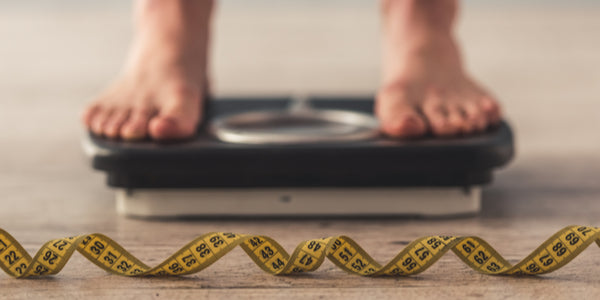
Can weight loss affect your period? As chronic dieters and athletes know, sometimes swift weight loss means period changes. This might make you wonder, “Is weight loss on my period even healthy?”
Read on to learn all about the menstrual cycle and weight loss changes for women.
What Happens With Hormones And Weight During Your Menstrual Cycle
Periods on their own can be uncomfortable enough. Add in hormone fluctuations and it may seem like you’ve got a recipe for disaster. However, understanding how weight and period changes is an important step to becoming more aware of your menstrual cycle.
There are four main hormones at play during different days in your menstrual cycle:
• Estrogen
• Progesterone
• Follicle Stimulating Hormone (FSH)
• Luteinizing Hormone (LH)
Estrogen and Weight
In the body, estrone (a type of estrogen) is the main estrogen found in the fat tissue of premenopausal women. Fat tissue (adipose) isn’t necessarily “bad.” In fact, adipose actually helps convert estrogen into different forms that the body can use.
However, studies have shown that an increase in waist circumference (i.e. gaining weight) is linked to higher levels of estrogen production in fat tissues. This doesn’t mean that gaining weight will automatically result in messed-up hormone metabolism. Basically, what research suggests is that hormones and fat tissue have a complex relationship.
Other Hormones and Weight Changes
The ratio of LH and FSH to weight has been studied more in recent years to help researchers better understand a health condition called Polycystic Ovary Syndrome (PCOS). PCOS is the most common hormone-related problem for women of reproductive age. One of the diagnostic tools doctors and healthcare professionals use to identify PCOS is an elevated LH:FSH ratio.
Classically, obesity and insulin resistance have been associated with PCOS. However, recent studies have shown that body mass index (BMI), a measure that helps women determine if they fall into the “obese” or “normal” weight categories, was not correlated with an increase in LH:FSH ratio. In other words, lower weight women can suffer from an imbalance of hormones, too.
How to Make Sense of Period Hormones and Weight Changes
Trying to make sense of the research can be tricky. It seems like classical methods that once linked weight to hormone disruption are becoming outdated.
A tried and true method to finding out if your weight is wreaking havoc on your hormones? Meet with a doctor and ask for blood tests. These can help you determine whether you fall within a normal range or need medication, lifestyle changes, or other healthy habits to help you better manage the stage of life you are in.
Another action you can take to better understand your hormone health is to maintain a healthy weight. Staying within a healthy weight range can support your body in its hormone metabolism. A dietitian can help you find what weight range is healthy for you while also suggesting sustainable, long-term goals to get you to a healthy weight.
Can Weight Loss Affect Your Period?
If you didn’t already know, your period requires energy! This means that other extreme experiences can interfere with the body’s natural cycles.
Some of the most commonly cited reasons for menstrual irregularities include:
• Disordered eating
• Excessive exercise (i.e. athletes)
• High levels of stress
Adolescence is an especially tricky time. Girls can experience a distorted perception of weight loss even before teen years. This can cause a hyper-focus on weight at a time when gaining a normal amount of weight is crucial to maintaining a normal menstrual cycle. It can also lead to dangerous nutrient deficiencies, which can affect more in the body than just weight.
One of the body’s signaling pathways, called the hypothalamic-pituitary-ovarian axis, must remain in balance for hormone health. Amenorrhea, or loss of your period (which can occur due to the reasons listed above), is linked to dysfunction of this signaling system and ultimately results in a state where the body doesn’t produce enough estrogen.
What to Do If You Experience Weight Loss and Period Changes
Maintaining a healthy weight has many positive effects and is necessary for supporting a normal menstrual cycle. Low or imbalanced levels of hormones associated with your period can cause detrimental effects on the following:
• Bone health
• Fertility
• Sexual health
Here are three main areas to focus on if you are worried about weight loss and your period.
1. Adequate Nutrition
As mentioned above, your menstrual cycle requires energy. Whether you are going through puberty or menopause, a proper diet is essential to make sure you have enough fuel for your day. A dietitian can help you design a meal plan for the stage of life (and even the phase of your cycle) that you are in.
2. Physical Activity
You can’t mention exercise without talking about weight! Working with your healthcare team (i.e. doctors and dietitians) can help you determine how your weight is trending.
If you are headed towards obesity or being overweight, it might be time to consider weight loss and introduce other healthy habits. According to studies, doing so (in combination with a healthy diet) may also have the welcome side effect of making your periods easier to manage.
3. Estrogen Levels
If you’ve tried a few months of balancing your diet and working towards weight loss and nothing seems to be working, take a look at your estrogen levels. Your doctor may recommend seeing an endocrinologist or women’s health specialist (i.e. OB/GYN) once they have done all they can do. These specialists can help you identify and manage any existing disorders, such as those that affect your estrogen balance.
The Last Word on Weight Loss and Periods
Weight loss and periods have a complex relationship! The bottom line? It’s important to get personalized recommendations. Depending on your life stage, you may need to increase or decrease your weight in order to support a healthier menstrual cycle (or lack thereof)
References:
Geiker NRW, Ritz C, Pederson SD, Larson TM, Hill JO, Astrup A. A weight-loss program adapted to the menstrual cycle increases weight loss in healthy, overweight, premenopausal women: a 6-mo randomized controlled trial. Am J Clin Nutr. 2016;104(1):15-20.
Hetemäki N, Mikkola TS, Tikkanen MJ, Wang F, Hämäläinen E, et al. Adipose tissue estrogen production and metabolism in premenopausal women. J Steroid Biochem Mol Biol. 2021;209:105849.
Huhmann K. Menses Requires Energy: A Review of How Disordered Eating, Excessive Exercise, and High Stress Lead to Menstrual Irregularities. Clin Ther. 2020;42(3):401-407.
Kamemoto K, Yamada M, Matsuda T, Ogata H, Tanaka N, Sakamaki-Sunaga M. Relationship between weight management and menstrual status in female athletes: a cross-sectional survey. Women Health. 2021;61(8):819-827.
Rinonapoli G, Pace V, Ruggiero C, Ceccarini P, Bisaccia M, Meccariello L, Caraffa A. Obesity and Bone: A Complex Relationship. Int J Mol Sci. 2021;22(24):13662.
Saadia Z. Follicle Stimulating Hormone (LH:FSH) Ration in Polycystic Ovary Syndrome (PCOS) - Obese vs. Non-Obese Women. Med Arch. 2-22;74(4):289-293.
Sharp A. How to Get Your Period Back After Years Of Dieting. Abbey’s Kitchen. Published January 2022. https://www.abbeyskitchen.com/lost-your-period/.
Yawitz K. Menstrual Cycle Phases and Weight Loss: How to Ensure It Won’t Cramp Your Efforts. Diet vs Disease. Published May 2019. https://www.dietvsdisease.org/menstrual-cycle-phases-weight-loss/.







